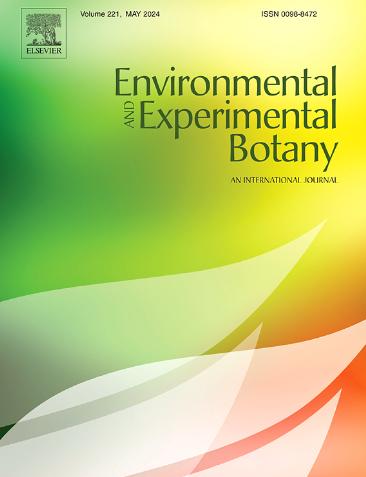亲本环境是影响盐生植物Tripolium pannonicum L.耐盐性的一个因素
IF 4.5
2区 生物学
Q2 ENVIRONMENTAL SCIENCES
引用次数: 0
摘要
在不同的生长阶段和发育阶段,亲本环境会对一系列植物性状产生重大影响。亲本盐度变化对子代萌发和环境因子反应的影响仍需深入研究。因此,我们研究了来自低盐度(Cie)和高盐度(Ino)生境的Tripolium pannonicum L.种子,以阐明后代对不同盐度的萌发潜力和适应潜力。发芽和生长实验分析了发芽参数、植株面积、与水有关的性状、有机溶质浓度、丙二醛和关键氧化防御酶的活性。在萌发实验中,与伊诺种子相比,Cie 种子在 200-400 mM NaCl 条件下表现出更高的萌发潜力和更长的萌发时间。在 100 mM 和 300 mM NaCl 条件下,Cie 群体的芽和根面积最大。伊诺群体在 200 mM NaCl 下的芽和根面积最大。在 400 mM NaCl 时,伊诺群体的茎皮层细胞面积有所增加。作为耐盐机制的一部分,伊诺群体增强了渗透溶质的合成。抗氧化酶分析表明,在盐度条件下,Ino群体的过氧化物酶活性较高,而Cie群体的超氧化物歧化酶活性较高,这表明不同群体在盐度适应过程中发挥着不同的酶作用。我们的研究结果突显了亲本环境条件在塑造后代性状、提高发芽潜力以及使后代植物适应不同环境中的关键作用。这项研究强调了特定种群对环境因素的反应,突出了盐生植物适应盐度机制的复杂性。本文章由计算机程序翻译,如有差异,请以英文原文为准。
Parental environment as a factor shaping salinity tolerance in halophyte Tripolium pannonicum L.
Parental environment can significantly influence a range of plant traits across different growth phases and developmental stages. The impact of parental salinity variability on offspring germination and environmental factor response still requires thorough investigation. Therefore, we investigated seeds of Tripolium pannonicum L. from low-saline (Cie) and high-saline (Ino) habitats to elucidate the germination potential and adaptation potential of progeny to varying salinity levels. Germination and growth experiments were conducted to analyze germination parameters, plant areas, water-related traits, the concentration of organic solutes, malondialdehyde, and the activity of crucial oxidative defence enzymes. In the germination experiment, Cie seeds demonstrated higher germination potential with longer germination time under 200–400 mM NaCl compare with Ino seeds. The Cie population achieved the highest shoot and roots area at 100 mM and 300 mM NaCl, respectively. The Ino population exhibited its highest shoot and roots area at 200 mM NaCl. The Ino population indicated an increase in stem cortex cell area at 400 mM NaCl. The Ino population enhanced the synthesis of osmolytes as part of the salinity tolerance mechanism. Antioxidant enzyme analysis indicated higher peroxidase activity in Ino and higher superoxide dismutase activity in Cie under salinity, suggesting distinct enzymatic roles in salinity adaptation between populations. Our findings highlight the critical role of parental environmental conditions in shaping progeny traits, enhancing germination potential, and enabling adaptation of progeny plants to diverse environmental niches. The study underscores population-specific responses to environmental factor, emphasizing the complexity of halophyte adaptation mechanisms to salinity.
求助全文
通过发布文献求助,成功后即可免费获取论文全文。
去求助
来源期刊

Environmental and Experimental Botany
环境科学-环境科学
CiteScore
9.30
自引率
5.30%
发文量
342
审稿时长
26 days
期刊介绍:
Environmental and Experimental Botany (EEB) publishes research papers on the physical, chemical, biological, molecular mechanisms and processes involved in the responses of plants to their environment.
In addition to research papers, the journal includes review articles. Submission is in agreement with the Editors-in-Chief.
The Journal also publishes special issues which are built by invited guest editors and are related to the main themes of EEB.
The areas covered by the Journal include:
(1) Responses of plants to heavy metals and pollutants
(2) Plant/water interactions (salinity, drought, flooding)
(3) Responses of plants to radiations ranging from UV-B to infrared
(4) Plant/atmosphere relations (ozone, CO2 , temperature)
(5) Global change impacts on plant ecophysiology
(6) Biotic interactions involving environmental factors.
 求助内容:
求助内容: 应助结果提醒方式:
应助结果提醒方式:


